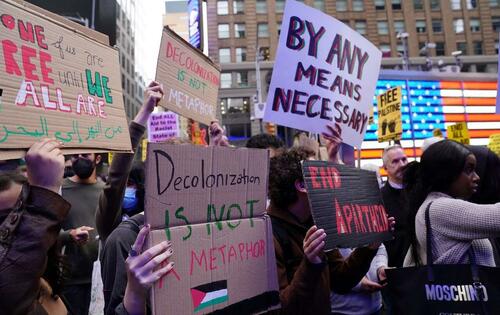From the Foundation for Individual Rights and Expression (Carrie Robison & Aaron Terr); if the facts are as described (and I’ve generally found FIRE’s accounts to be trustworthy), this does seem like a clear violation of the First Amendment:
New Jersey law requires all school boards in the state to set aside a portion of their meetings for public comment. During the Teaneck Board of Education’s Oct. 18 board meeting, many constituents voiced opinions about a recent letter from the district’s superintendent to students’ families following the events of October 7. In the letter, Superintendent Andre Spencer acknowledged the “latest incidents in the cycle of violence in the Middle East.” Spencer recommended that schools “foster an open dialogue” and called for “a comprehensive understanding of the complex factors impacting our world.”
Several parents and community members used the public comment period to criticize Spencer for not explicitly and forcefully condemning the attack. But when they described Hamas’s actions to support that criticism, the board repeatedly shut them down. The board took particular exception to commenters’ “graphic” descriptions of the attack and repeatedly told speakers to keep in mind that children were in the audience.
Yet when other commenters used their time to emphasize the plight of Palestinians and used similarly “graphic” language, the board allowed them to continue.
For example, when one speaker said it’s possible to unequivocally condemn Hamas’s actions without taking a side in the conflict “unless of course you’re trying to appease people who actually think that the raping and murdering and pillaging of the community is appropriate,” Board Vice President Victoria Fisher immediately cut him off. In contrast, the board remained silent when another commenter said, “These people talking about raping and piling bodies on top of each other, that happened in the Holocaust. And if they’re having PTSD for what they’re doing to the Muslim community in Palestine, that’s something they need to seek mental health counseling for.”
When a speaker rhetorically asked how others would feel if “Indigenous people in our country … pulled your kids out of their beds and then shot you in front of them,” Fisher disapprovingly interrupted. But the board allowed someone else to freely comment that Israel’s “dehumanizing and genocidal actions” and the “propaganda surrounding them have spread all the way to us, where kids are stabbed 26 times just for being Palestinian.”
The board also repeatedly warned speakers discussing the Hamas attack not to repeat details or facts already “on the record.” Yet several pro-Palestinian speakers repeated details mentioned by previous commenters without receiving such warnings or admonitions.
The First Amendment protects Teaneck citizens when they make public comments during a school board meeting. Any speech restrictions must, at a minimum, be viewpoint-neutral and reasonable in light of the purpose of the public comment period, which is to allow the public to “comment on any school or school district issue that a member of the public feels may be of concern to the residents of the school district.” The board could, for example, limit the amount of time someone can speak or require that comments pertain to the school district. But the board’s regulation of comments at the Oct. 18 meeting was not viewpoint-neutral, and the Supreme Court has called such viewpoint discrimination an “egregious” form of censorship.
Even if the board’s censorship wasn’t motivated by speakers’ views, it was arbitrary and divorced from clear, objective, and sufficiently precise standards, as the First Amendment requires.
Setting aside the issue of selective enforcement, the Teaneck Board of Education’s public comment policies reach far too much protected speech and are unreasonable in light of the purpose of public comment.
District policy authorizes the board to “[i]nterrupt and/or warn a participant when the statement, question, or inquiry is abusive” and to “[r]equest any person to leave the meeting when that person does not observe reasonable decorum.” During the Oct. 18 meeting, Board President Sebastian Rodriguez emphasized that the meeting was a “forum for decency” and told speakers not to make “graphic comments.” These restrictions go too far. That board members or other observers might personally consider comments inappropriate isn’t a constitutional reason to suppress them.
The fact that children might be present at a board meeting is also no excuse for shutting down speech. The government cannot limit discourse among adults “to that which would be suitable for a sandbox.” The Supreme Court has unequivocally rejected the idea that the government has a “free-floating power to restrict the ideas to which children may be exposed.”
A school board meeting may take place in a school, but it isn’t a kindergarten class. It’s a time to discuss educational and administrative matters, some of which may involve sensitive or controversial topics. The board has no authority to constrain a citizen’s participation in those discussions by effectively labeling them “E for everyone.”
Barring speakers from restating facts already mentioned by someone else similarly borders on nonsensical. As we told the board:
Some speakers may need to refer to facts mentioned by another speaker to present their own arguments intelligibly. A speaker may wish to express agreement with and reinforce others’ points by restating key facts. When multiple speakers make similar arguments and emphasize the same facts, they communicate a message that is stronger than that delivered by any one of them alone. Restricting this practice undermines the public comment period’s purpose of soliciting and gauging community sentiment.
And if all that weren’t enough, the board’s rules are also unconstitutionally vague—that is, they leave too much room for subjective interpretation. When is a comment “abusive,” “graphic,” inappropriate for children, or a breach of “reasonable decorum”? The answer will vary from person to person.
The board has no policies or guidelines that flesh out the meaning of these terms. And the predictable result—as the Oct. 18 meeting showed—is arbitrary and discriminatory enforcement….
Note that I’ve consulted for FIRE before, but I haven’t been involved with this matter.
The post Teaneck (N.J.) Bd. of Education Allegedly "Selectively Restricts Public Comments About the Israeli-Palestinian Conflict" appeared first on Reason.com.
from Latest https://ift.tt/WgZYCsK
via IFTTT

